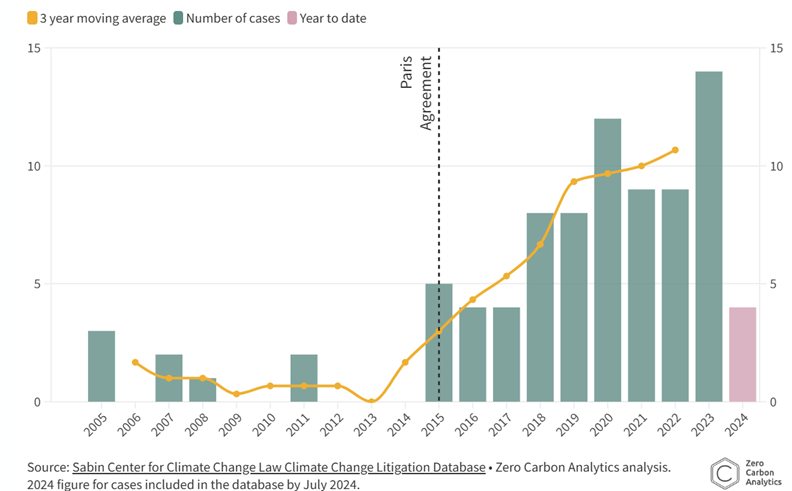Maine becomes the latest US state to take legal action against major oil and gas companies, alleging they and the American Petroleum Institute (API) have deliberately misled the public about the climate consequences of burning fossil fuels. Maine joins other states, including New Jersey and California, in similar lawsuits. In total, more than two dozen climate deception lawsuits have been brought against fossil fuel companies by cities, counties, states, and tribal governments over the last 7 years.
The number of cases filed annually against fossil fuel companies, including BP, Chevron, Eni, ExxonMobil, Shell, and TotalEnergies, has nearly tripled since the Paris Agreement was reached in 2015.
Three categories of lawsuits have grown significantly in recent years: compensation for climate damages (38% of cases); misleading advertising claims (16%); and emissions reduction (12%). The lawsuits aim to hold major fossil fuel companies accountable for the significant role they played in causing climate change. The lawsuits claim the companies knowingly produced, and marketed products they are aware to have devastating environmental consequences.
Legal Cases Filed Annually Against Fossil Fuel Companies: 2005-2024

Maine Takes on Big Oil in Climate Lawsuit
Maine alleges ExxonMobil, Shell, Chevron, BP, Sunoco, and the API have deceived the public for decades about the climate risks of fossil fuels, leading to significant harm to the state. The state seeks damages to cover the costs of adapting to and mitigating the impacts of climate change, such as rising sea levels, more severe storms, and other consequences. Maine is already experiencing more frequent flooding and warming ocean waters. According to the lawsuit, the impact has become more costly and severe due to the “successful climate deception campaign” orchestrated by the industry to delay the transition away from their products and protect their profits.
Governor Janet Mills emphasized that “last winter’s devastating storms are just further proof that climate change is harming our lives, our health, and our economy – and it is time for the fossil fuel industry to be held responsible. Attorney General Frey has always stood up for what is best for Maine people, and I applaud him for doing so yet again by filing this important lawsuit on their behalf,” Mills added.
The state is asking that the court require the defendants to pay for past and future climate harms caused by the defendants. In addition, Maine is demanding a jury trial and seeks relief in the form of damages, penalties, abatement, and disgorgement of profits. More than 20 states, tribes, cities, and counties have brought similar climate deception lawsuits to date, including the states of New Jersey, California, Delaware, Minnesota, Vermont, Connecticut, Massachusetts, and Rhode Island, along with the District of Columbia.
The Legal Battleground for Climate Action
Oil and gas companies have tried to remove these cases to federal court, arguing that state claims based on deceptive marketing and failure to warn are tied to global emissions, which are regulated by federal law. Plaintiffs argue that focusing on localized harm, such as deceptive marketing tactics or the failure to warn, means their claim falls squarely within the state’s jurisdiction and is not preempted by federal regulations. Plaintiffs are relying on the procedural precedent set in tobacco and opioid deception cases. State-based claims were brought against defendant tobacco and opioid companies in efforts to hold companies accountable for misleading the public about their products’ harms resulting in significant financial settlements. Defendant tobacco companies were required to pay a $246 billion settlement to state governments as a part of a 25-year plan, while four of the largest U.S. opioid corporations reached a $26 billion settlement with state and local governments in 2020.
Due to this strong procedural precedent, plaintiffs have been largely successful in asserting jurisdiction over defendant fossil fuel polluters as courts across multiple circuits have remanded cases back to the state courts, rejecting defendants’ arguments for federal jurisdiction. Most recently, the California Supreme Court denied motions to dismiss nine climate lawsuits brought by the California Attorney General for lack of personal jurisdiction.
The Supreme Court and the Future of Climate Lawsuits
Despite these victories, the Second Circuit’s 2021 decision in City of New York v. Chevron Corp. created a circuit split, opening the door to Supreme Court review. In this case, the court dismissed New York City’s claims, holding that federal statutory law displaced plaintiff’s state public nuisance and trespass claims because the regulation of cross-border greenhouse gas emissions fell under federal jurisdiction through the Clean Air Act.
The Supreme Court has taken an increased interest in climate change litigation. In 2024, the Court requested briefs from the U.S. Solicitor General on whether federal law preempts state law claims in climate deception cases such as Suncor Energy v. Board of County Commissioners of Boulder County in October 2022 and Alabama v. California in May 2024.
Conclusion
These cases aim to hold fossil fuel companies accountable for their significant role in contributing to climate change, and to recover costs associated with the resulting damages. While oil and gas companies have challenged these lawsuits, arguing that federal law preempts state-level claims related to climate change, plaintiffs have largely been successful in asserting jurisdiction in state courts. This litigation draws parallels to successful lawsuits against tobacco and opioid companies.
Recently, the Supreme Court has demonstrated increased interest in climate change litigation, which potentially impacts the future of these cases. The outcome of these lawsuits will have significant implications for the fossil fuel industry, potentially leading to increased regulations, financial penalties, and a shift toward greater accountability for climate-related harms.


